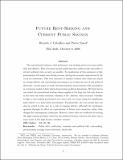Future rent-seeking and current public savings
Author(s)
Caballero, Ricardo J; Yared, Pierre
DownloadFuture Rent-Seeking and Current Public Savings.pdf (274.2Kb)
PUBLISHER_CC
Publisher with Creative Commons License
Creative Commons Attribution
Terms of use
Metadata
Show full item recordAbstract
The conventional wisdom is that politicians' rent-seeking motives increase public debt and deficits. This is because myopic politicians face political risk and prefer to extract political rents as early as possible. In this paper we study the determination of government debt and deficits in a dynamic political economy model. We show that this conventional wisdom relies on economic volatility being low relative to political uncertainty. If economic volatility is high relative to political uncertainty, then a rent-seeking government actually over-saves and over-taxes along the equilibrium path relative to a benevolent government. This result emerges because of the option value of rent-seeking: a rent-seeking government over-values future funds because of the possibility of using them for future rents instead of cutting taxes in the event of a future boom (when marginal utility of private consumption is low). This over-saving bias is temporary since, in the long run, the rent-seeking government over-borrows relative to the benevolent government as it eventually squanders the funds it has accumulated. We find that both the under-saving and over-saving bias of the government can be solved by a rule of capping deficits.
Date issued
2010-08Department
Massachusetts Institute of Technology. Department of EconomicsJournal
Journal of International Economics
Publisher
Elsevier
Citation
Caballero, Ricardo J. and Yared, Pierre. “Future Rent-Seeking and Current Public Savings.” Journal of International Economics 82, no. 2 (November 2010): 124–136. © 2010 Elsevier B.V.
Version: Original manuscript
ISSN
0022-1996